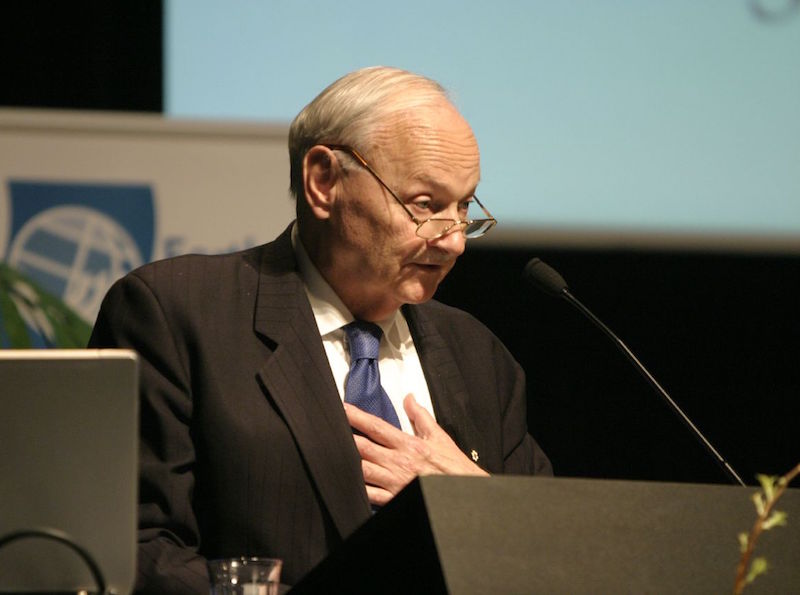rabble is expanding our Parliamentary Bureau and we need your help! Support us on Patreon today!
The first UN environmental conference was in Stockholm in 1972. Canadian Maurice Strong who very recently passed away, organized it, and he went on to become Secretary General of the newly created United Nations Environmental Programme headquartered in Nairobi, Kenya.
A summary of the Stockholm debate stated its purpose:
“launching a new liberation movement to free men (sic) from the threat of their thralldom to environmental perils of their own making. The movement could succeed only if there was a new commitment to liberation from the destructive forces of mass poverty, racial prejudice, economic injustice and the technologies of modern warfare. Mankind’s whole work and dedication must be towards the ideal of a peaceful, habitable and just planet.”
The Stockholm conference was for governments, but the impetus for it came from environmental activists. Strong understood this, and made a place for non-governmental organizations at the first UN conference, and again 20 years later at the Earth Summit (formally the UN Conference on Environment and Development) held in Rio de Janeiro, Brazil in 1992, where he again served as Secretary General.
Maurice Strong was an activist, not what was expected of a UN diplomat. Even more surprising was his background; he worked in the Calgary oil patch for Dome petroleum legend Jack Gallagher. By age 35 Strong was president of Montreal-based Power Corporation.
In 1967 he was recruited by Paul Martin Sr. and Lester Pearson to head up Canadian international development efforts. Strong transformed the External Aid Office of the old Department of External Affairs into the Canadian International Development Agency (recently terminated by the Harper Conservatives).
He may have been a businessman, but Strong understood that there was no such thing as the free market economy; businesses take subsidies to produce fossil fuels, he liked to point out.
Re-thinking the relationship between business, government and the economy is what ending environmental destruction was all about for Strong. His detractors assumed he was a socialist. Mainly, he will be remembered as an environmental activist on a world scale, one of the first, and the most prominent.
Governments acting as “a committee for managing the common affairs of the whole bourgeoisie,” to quote the Communist Manifesto, have been instrumental in creating, protecting and advancing industrial society. Democratic movements are needed to put collective power into service of the planet.
Citizen activists carry the battle for the environment, conserving water, taking out blue boxes, reducing carbon footprints, sharing knowledge and making others aware of how daily lives need to change. Local action on the environment will decide the outcome on a host of issues identified by science and debated around the world.
At Paris COP21, from this week until December 11, the issues identified 43 years ago in Sweden still require action. The underlying question remains: how should people live together on this shared planet?
The consumption of meat is a major contributor to climate change and environmental degradation, but the subject of diet remains a taboo for many green advocates.
It is more easily recognized that the way we produce goods and services and extract resources is burning up the planet. A focus on fossil fuel production, transport and consumption is what drives groups like 350.org, and energy will occupy centre stage in Paris.
Corporations have been identified as the main actors responsible for environmental destruction and chronic disease. Estimates by Pure Earth put “1 in 7 deaths in 2012 resulting from exposure to soil, water, air and/or chemical pollution.”
The corporate-built economy may be well recognized as the source of environmental problems, but corporate leaders are divided as to what to do.
Some corporations see environmental concern as a business opportunity, and are re-inventing themselves as green. Others are mainly interested in getting consumers to pay for change. Witness the corporate consensus in favour of carbon taxes.
It has recently come out how out Big Oil invented climate change denial. For years oil companies have paid to discredit climate change research.
Social movement activists doubt that corporations so want to save the world, they are prepared to sacrifice profits to do it.
Protecting the environment requires economic change on a major scale. Paris climate diplomacy focuses on treaties, targets and timetables for reducing greenhouse gas emissions. Governments come to announce their targets and timetables. Countries grown rich while producing climate-changing emissions are expected to contribute to the general welfare by helping poorer countries transition to cleaner energy. The U.S. insists it will make no legally binding commitments, and Canada follows suit.
Climate has become an issue in the same way that nuclear weapons are an issue. Everyone knows nuclear warheads represent grave danger, and yet doubts remain that the world will be up to addressing the risks inherent in building and storing them, let alone using them.
Desmond Tutu has reminded us that “184 nations have already made a legal undertaking never to obtain nuclear weapons, and three in four support a universal ban.”
In 2015, the 196 parties to the UN Convention on Climate Change 21st meeting in Paris need to come together in the same way. A common undertaking to reduce greenhouse gas emissions is what citizens expect from their governments.
Duncan Cameron is the president of rabble.ca and writes a weekly column on politics and current affairs.
Photo: Richard Chu/flickr
rabble is expanding our Parliamentary Bureau and we need your help! Support us on Patreon today!



